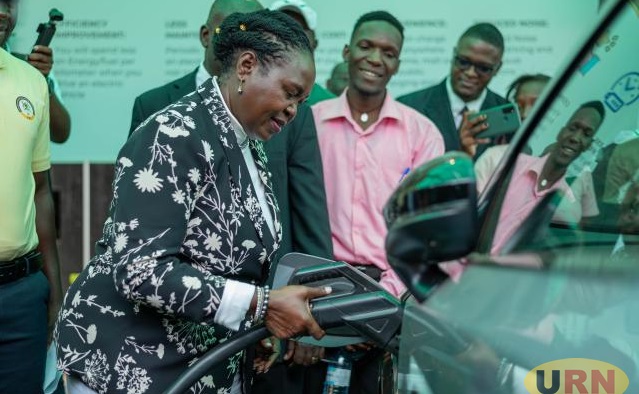
Kampala, Uganda | THE INDEPENDENT | The Government officially launched the National Biofuels Blending Programme, marking the start of mandatory blending of petrol (Petroleum Motor Spirit—PMS) with 5% ethanol (E5).
The initiative is a cornerstone of Uganda’s strategy to strengthen energy security and advance environmental sustainability.
Speaking to journalists at the Uganda Media Centre, Ruth Nankabirwa Ssentamu, Minister of Energy and Mineral Development, said the programme—grounded in key policies and legislation—will reduce dependence on imported fossil fuels, create local jobs, and drive economic transformation through agricultural value addition.
“The programme is anchored in a solid legal and policy framework, including Vision 2040, Uganda’s long-term development blueprint,” Dr. Nankabirwa noted.
“It is also guided by the National Energy Policy 2023, the Biofuels Act 2020, and the Biofuels (Licensing) Regulations 2022, which set out licensing procedures, blending thresholds, and quality standards.”
In line with the Biofuels Act, Uganda will start with a 5% ethanol blend and progressively increase to 20% (E20) in the coming years.
According to the Ministry, the programme is expected to reduce dependence on volatile international fuel markets, cut greenhouse gas emissions and air pollutants, provide new markets for farmers and higher value through ethanol conversion, promote investment in biofuel production and infrastructure, and position Uganda as a regional supplier of ethanol-based fuels, including blends for emerging aviation markets.
The National Biofuels Blending Programme also aligns with Uganda’s commitments under the Paris Agreement on climate change and its Nationally Determined Contributions (NDCs).
The programme will be implementation through four strategic blending facilities: Modern Energy Ltd (Busia) – 49 million litres/month, operational by mid-July; Bukona Agro Processors Ltd (Malaba) – 48 million litres/month, operational by end of July; Afro-Kai Ltd (Mutukula) – 6–8 million litres/month, operational by end of August; and Lake Victoria Logistics (Kawuku-Entebbe) – 10 million litres/month.
Collectively, these facilities will process over 110 million litres of PMS annually, blended with ethanol at 5% volume. The Ministry reported that 78.5 million litres of ethanol are already available locally, with an additional 110 million litres in the pipeline.
Dr. Nankabirwa further announced that multiple ethanol producers have been licensed, including Pro Industries, Kakira Sugar Ltd, G.M. Sugar Ltd, Hoima Sugar Ltd, and Bukona Agro Processors Ltd (BAPUL).
Bukona’s CEO, Palvin Kekal, confirmed that construction of their Malaba facility is well underway. The government, through the Uganda Development Corporation (UDC), has invested UGX 12 billion in Bukona, securing a 40% stake under the UDC Act, 2016, to accelerate industrialisation.
Daudi Migereko, Chairperson of the National Biofuels Blending Committee, highlighted the programme’s potential to transform rural livelihoods. “Farmers who have struggled with unsold sugarcane will now have a guaranteed market. Ethanol production offers a sustainable solution, converting surplus crops into clean fuel. This programme will raise household incomes like never before,” he said.
“By increasing demand for locally grown crops, we expect to promote agro-industrialisation, reduce post-harvest losses, and improve household incomes,” Migereko added.
To support effective rollout, the government has introduced measures including fair pricing, robust standards and quality control to prevent adulteration, and tax exemptions on denatured ethanol to maintain affordability and programme integrity.
Oil marketing companies have been urged to prepare for full-scale implementation during the six-month incubation period ending 31 December 2025. Ugandans are also encouraged to embrace the cleaner fuel alternative, which enhances engine performance and combustion efficiency.
The National Biofuels Blending Programme marks a new chapter in Uganda’s energy independence, agricultural resilience, and environmental stewardship. By leveraging local innovation, strong legislation, and strategic partnerships, Uganda is setting the pace for a cleaner, more inclusive energy future in the East African region.
****
URN
 The Independent Uganda: You get the Truth we Pay the Price
The Independent Uganda: You get the Truth we Pay the Price



